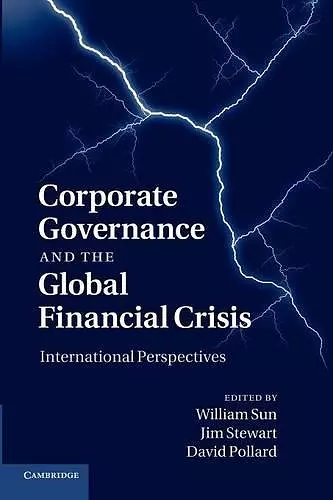Corporate Governance and the Global Financial Crisis
International Perspectives
Jim Stewart editor David Pollard editor William Sun editor
Format:Paperback
Publisher:Cambridge University Press
Published:29th Nov '12
Currently unavailable, and unfortunately no date known when it will be back

This book provides critical insights on the systemic failures of corporate governance linked to the global financial crisis.
In this book, leading scholars provide critical insights on the systemic failures of corporate governance linked to the global financial crisis. They provide suggestions on how the governance problems could be tackled to prevent or mitigate any future financial crisis and explore new directions for post-crisis corporate governance research and reforms.Over the last two decades there has been a notable increase in the number of corporate governance codes and principles, as well as a range of improvements in structures and mechanisms. Despite this, corporate governance failed to prevent a widespread default of fiduciary duties of corporate boards and managerial responsibilities in the finance industry, which contributed to the 2007–10 global financial crisis. This book brings together leading scholars from North America, Europe, Asia-Pacific and the Middle East to provide fresh and critical analytical insights on the systemic failures of corporate governance linked to the global financial crisis. Contributors draw from a range of disciplines to demonstrate the severe limitations of the dominant corporate governance framework and its associated market-oriented approach. They provide suggestions on how the governance problems could be tackled to prevent or mitigate any future financial crisis and explore new directions for post-crisis corporate governance research and reforms.
Review of the hardback: 'There is no doubt about the timeliness and relevance of this book. Practitioners, supervisors, regulators and those teaching or studying corporate governance would all gain from reading it. I am particularly impressed by the breadth of the analysis and the choice of contributors. It is essential that potential reforms should be based on as clear an understanding as possible of the nature of the relationship between corporate governance and the financial crisis. The introduction to the book alone should be compulsory reading for those concerned with shaping the future of corporate governance in a world-wide context.' Sir Adrian Cadbury, Honorary Professor, Aston Business School
Review of the hardback: 'Did poor corporate governance contribute to the global financial crisis? The OECD and the UK regulators felt that existing corporate governance codes were adequate: the problem was a failure to implement them. In this book, twenty-two leading scholars and leaders of corporate governance thinking take a different view. Deregulation prompted high risk taking; boards failed to understand their exposure to strategic risk; and rating agencies, paid by those they rated, were outpaced by financial innovation. Over-incentivized bank executives pursued vast securitization, high leverage and excessive risk to the ultimate detriment of everyone else. The theme emerges that the Anglo-American corporate governance paradigm, particularly as adopted in the US, gives CEOs excessive power and wealth to the shareholders' detriment. New directions are needed. This work offers some new thoughts and options.' Bob Tricker, author of Corporate Governance: Principles, Polices and Procedures, 2nd edition
ISBN: 9781107411715
Dimensions: 229mm x 152mm x 22mm
Weight: 550g
416 pages